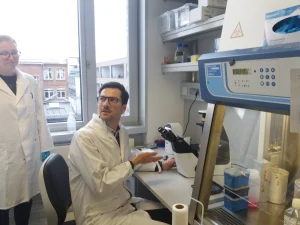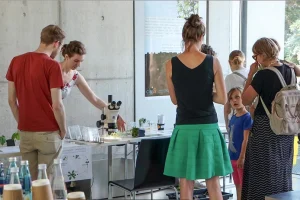
Exploring Cutting-Edge Biological Signalling Research in Freiburg
The Lord Mayor of Freiburg, Martin Horn, recently embarked on a visit to the renowned Signalhaus Freiburg, a symbol of research excellence housing the Clusters

The Lord Mayor of Freiburg, Martin Horn, recently embarked on a visit to the renowned Signalhaus Freiburg, a symbol of research excellence housing the Clusters
The research unit “UcarE – Urothelial Carcinoma Epigenetics” aims to investigate the biological mechanisms that underlie bladder cancer. The unit’s spokesman is Prof Dr Ian

In June, the two Freiburg signalling research centres CIBSS and BIOSS gave visitors insights into current research topics.
Glowing molecules and the memories of plants:
I am Professor in the Department of Biochemistry, University of Geneva, Switzerland. Many biological systems are made of viscoelastic surfaces. We are interested in understanding how the unique physical properties of lipid membrane and epithelia respectively contribute to membrane traffic and organogenesis. To study this, we use in vitro models to measure relevant physical parameters, such as forces, rigidity, tension, and diffusion constants. Specifically, we are interested in how these mechanical properties constrain the action of proteins involved in membrane deformation, fission and fusion, in particular in membrane traffic. For example, the lipid bilayer that delimitates cells from their environment is a 2D fluid interface/barrier that can be deformed easily and is resistant to stretch. The plasma membrane is being constantly remodeled through processes such as endocytosis in membrane traffic. Another example, but at a different scale, is the epithelium, a cell monolayer that separates organs from the external environment. These epithelia grow and fold during development to form organs, being viscoelastic surfaces. We have established several techniques and instrumentation to study these processes in vitro, and in particular measure the forces involved in in both remodeling of lipid membranes and of epithelium. We have specific expertise in the main machineries that catalyze membrane fission in cells, i.e. dynamin and ESCRT-III. We are pioneers in reconstituting in vitro ESCRT-III and dynamin mediated membrane fission, and in understanding the mechanism by which they perform this function. We have also established assay for epithelium remodeling, through which we have shown that epithelium deformation can occur through buckling.
Because of our strong expertise in ESCRT-III mediated endosomal function, both in vitro and in vivo, we will collaborate with the Perera lab to conduct experiments that will determine a role for MYOF at the lysosome in PDA cells.
© BIOSS Centre for Biological Signalling Studies
Albert-Ludwigs-Universität Freiburg
Schänzlestr. 18 | D-79104 Freiburg | Email: christine.ehler@bioss.uni-freiburg.de | Phone: +49 761 / 203 – 97374